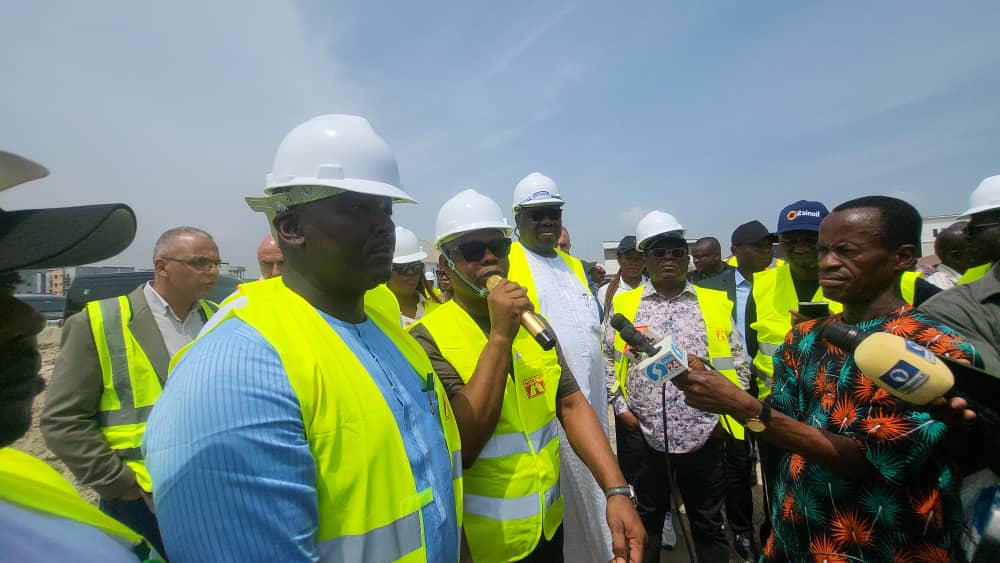
Breaking: NASS Joint Committee on Works, Federal Works Ministry Hold Stakeholders’ Engagement on Lagos-Calabar Coastal Highway Project
Coastal road: Drama as Minister threatens to throw out CEO at stakeholders’ meeting
There was a mild drama at the stakeholders’ meeting of the National Assemby, NASS, Joint Committee on Works and the Federal Works Ministry in Lagos on Lagos-Calabar Coastal Highway Project, as the Minister of Works, Dave Umahi, threatened to throw out Engineer Ifeoma Stella Okengwu, Chief Executive Officer of Winhomes Estate, which N250 million properties were destroyed at Okun Ajah community.
A stakeholder engagement meeting was
held on Sunday, November 3, 2024 at Orchid Hall, Eko Hotel, Lagos,
towards resolving the contentious issues on the construction of the Lagos-Calabar Coastal Road.
The stakeholders meeting followed a barrage of criticisms that continued to trail the execution of the construction of the Lagos-Calabar Coastal Road from various stakeholders, including the Federal Ministry of Environment, real estate investors, engineers, and impacted communities.
In her remark at the stakeholders’ engagement meeting, Engineer Okengwu called on President Bola Tinubu to intervene directly, restore the original coastal road alignment.
She said the Senate Committee on Works should investigate the alleged corruption perpetrated by Federal Ministry of Works officials in collision with the contractors of the project, the Hitech Construction Company.
She also alleged that the Minister’s actions threatened to derail the President’s foreign investment drive and tarnish Nigeria’s reputation as a viable destination for global finance.
“We are law-abiding citizens. We have followed every legal process. The destruction of our property is an attack on the integrity of the investment landscape in Nigeria,” she stated.
“We are appealing to the President to hold his officials accountable and ensure that this miscarriage of justice is corrected.”
Her reactions also followed all the stakeholders parley along the highway corridor express at the weekend.
The stakeholders expressed worries, in particular, regarding the road diversion into Okun Ajah community, by the Hitech Construction Company, handling the project, advocating a return to the original 2006 alignment.
Indeed, the Environmental and Social Impact Assessment (ESIA) Panel set up by the Ministry of Environment identified several flaws in the draft ESIA report for the Lagos-Calabar Coastal Highway construction project, leading to setbacks on the historic project.
The panel, chaired by Professor Oladapo Afolabi, a former Head of the Civil Service, and Engr Dr. Musa Emoabino, Prof. Dalhatu Singeri, and Mr. Adedoyin Lasisi as members, identified the deficiencies in the draft ESIA, particularly the reason for the Okun Ajah road diversion as being inadequately addressed.
Specifically, the panel, which insisted that the project proponents must address the highlighted concerns, during a session in Lagos, queried the lack of adequate technical explanation for the road diversion at the Okun Ajah section in the draft ESIA report.
Engr Dr. Musa Emoabino said the report failed to mitigating against disturbing challenges that would occur during the construction of the highway, particularly in terms of the flooding of the area which has already caused some community land to be washed away by the ocean surge.
He reinforced stakeholders’ calls to realign the road towards the ocean to protect the community from coastal surges.
According to him, “The initial route was altered for unspecified reasons, sparking significant community interest, yet we have not received a technical justification for this change.”
Also, Engr Femi Adekoya said the timing of the ESIA report was wrong, noting that the Federal Ministry of Works has, indeed, “put the cart before the horse.”
Similarly, Dr Mike Akinlola of Barrie Billions Ltd, who represented investors’ interests, commended the Federal Government for the Coastal Road initiative, but raised two matters of interest in the execution of the project.
According to him, the Coastal Road, constructed at a certain elevation, can actually serve “as shoreline protection to the entire Lekki Peninsula by retaining the existing alignment, which was much closer to the ocean shores. This way, most of the villages, cultural heritage, and investments are preserved, especially against certain predictions by environmentalists that the Lekki Peninsula may become completely eroded by the ocean in the next 50 years or so.”
He also faulted the discrepancies in the reasons adduced by the Federal Ministry of Works for the realignment into inner Okun-Ajah community from the original alignment, being the presence of submarines cables of some Telcos around the Okun-Ajah axis at around Kilometres 16 and 17, saying the submarine cables are actually said to be around the Sango-Tedo area and around Kilometre 25-27.
He believed based on stakeholders’ conclusions that both Federal Ministries of Works and Environment will co-operate and embark on a thorough review of the execution of the project.
After considering these observations, he believed the original and initial road alignment would be maintained to ensure that the project remains a legacy for the Tinubu administration.
However, Dr. Abass Suleiman, who represented the Minister of Environment, Alhaji Balarabe Abass Lawal, assured all the stakeholders that their concerns would be communicated to President Bola Ahmed Tinubu.
“All your concerns have been noted, and I will convey them to the Honourable Minister, who will ensure they reach the president,” he said, promising a mutually acceptable resolution of all issues concerning the project.
Corroborating Dr. Suleiman, Professor Afolabi reassured stakeholders that the Ministry of Environment would address all socio-economic concerns related to the road, stating, “Everything will be taken into consideration, and the impacts will be mitigated.”
